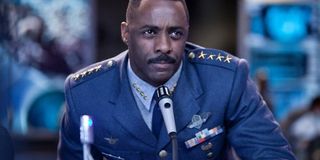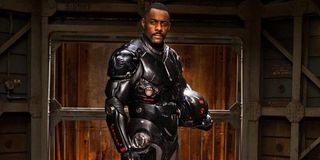Idris Elba On Finding A Zen-Like State In Pacific Rim

In Guillermo del Toro’s Pacific Rim, Idris Elba stars as Stacker Pentecost, the commanding officer at the head of the world’s Jaeger program – the operation in place to construct and train the skyscraper-sized mechs that defend our world from the otherworldly monsters known as the Kaiju. The every decision that Pentecost makes affect the lives of millions, making calls not just on strategy but also in assigning pilots. Despite that enormous pressure, it is his responsibility to maintain a level head at all time and keep a sense of calm – something Elba had to bring out of himself when approaching the role.
With Pacific Rim in theaters on Friday, earlier this week I had the great opportunity to speak with the star on the phone about his latest film. Read on to find out how he made sure to make his character standout amongst all of the CGI, balancing his career between film and television, and how it was del Toro that really attracted him to the project in the first place.
You’ve actually been doing quite a lot of genre films in the past couple years, between this and Thor, Prometheus, Ghost Rider. I’m curious are these the kinds of films you’re especially drawn to?
No, it’s a combination of, you know, the last three films, Thor, Prometheus, and Pac Rim, are all because of the directors, you know, Kenneth Branagh, Ridley Scott and Guillermo were on my bucket list of directors I wanted to work with and Ghost Rider was really cause I wanted to work with Nic Cage. I love Nic Cage, so that was the reasoning, but I’m not really drawn to the genre. You have to understand, actors really don’t get drawn to a genre. They want to work and they want to calculate themselves into what kind of films, you know, what kinds of films they want to do. For me, each genre film was very much the genre, but they’re all very different characters. That’s more exciting to me.
With so much going on action-wise, especially in this film, is there an extra challenge to kind of make your character stand out?
Is it a challenge to make my character stand out? I mean, you know, with any genre film, the hardest part is the make the human element story really stand out, to be honest. And I definitely try my hardest to bring that, every time, to life, you know? Who is he? What is he saying? What is he really saying? Oh yeah, there’s this fifty foot robot, but what is he really saying? And that’s important. It’s important to these types of films. It’s important to my career.
You mentioned that what attracted to this project was the chance to work with Guillermo del Toro, but when you were first looking at the script, and first taking in the character of Stacker Pentecost, what was it that really connected you to him?
CINEMABLEND NEWSLETTER
Your Daily Blend of Entertainment News
You know, I tend to play characters that I’m emotionally sort of like one way or the other, you know. Stacker was super, super calm all the way and then when he lost his shit, he really lost his shit. He was so calm and zen-like and I wanted that to be my next challenge as an actor, to bring a real character in a massive film, that has poise.
How much did you collaborate with Guillermo del Toro on the character?
It was a full collaboration. It was conversation after conversation and there was a huge amount of, you know, material he’d already written and put forward, and so, we sat down as a team and just we rehearsed it, we spoke about it, we spoke about the connections. In a movie like this, where all you can talk about is robots and stuff, all you can see if robots and stuff, you really need to really hammer out the human stories. So, he spent a lot of time doing that with us.

How much did he really kind of bring you along for the ride with the film, taking you into the larger world beyond just your character?
It was all the way, he was very much, from the first day, he, you know, just took us around the production office, really explained every detail of what we were looking at, especially me and Rinko, we had to understand what we were talking about, you know, these monsters, but all that stuff is some stuff we really had to understand, and he did it in great detail and made it very clear that we study this stuff, you know.
What was your expectation going in to working with Guillermo del Toro, and what was it like working with him on a day to day basis?
Oh, he’s very detailed. He’s very sort of like, “Good morning guys. How are you today? This is what we’re doing and this is how it fits in the film and this is how it’s going to look and this is how I need the passion to be. Do what you want, but imagine, when I’m in the editing room, this is what I need it to feel like.” He very much sort of gave you like a play by play of what he’s trying to do and what he wants to see in the film.
One of the hallmarks of his filmmaking style is that he really try to include as many practical effects as possible. As an actor, how much does that really have an impact on taking you into the world?
I mean, it’s super, super important because now, these days, everything is green screen, which looks amazing, but it’s hard for an actor to find the center of what’s really happening. You’re looking at a building that’s not really there, but you have to react to it. It’s really important, that a director is at least explaining the practical sense. My perception over all, I was in the command station quite a bit, so that was all very real, all that detail was all there, so you really feel the weight and the immenseness of the story line and what was going on.
Is there kind of a dark side to it too? You kind of make a joke about it in the film, but those suits and the set-ups in the Jaeger cockpit don’t really seem that comfortable.
Yeah, they were not. They were the worst part of the filmmaking process because they were so uncomfortable. I had a harness and then you got thrown onto this gimbal and it was moving a million miles an hour and it was very tough. It wasn’t that fun.
One question I have is that one thing which has really changed about the film industry in general, well the entertainment industry, is the fact that the line between film and TV has really disappeared in recent years, and frankly, you’re a big part of that between your work on Luther and The Wire and just your big screen work. So, when you are considering parts, is medium something that you’re considering? Are you looking at TV versus film or are your looking purely at collaboration and/or character and story?
Well, I’ve been working for such a long time, not to age myself, but you know, I think the tougher stuff is interesting, if it’s on TV or the small screen or the big films. You know, back in the day, an actor could get penalized for doing too much TV. In my case, you know, I’ve done lots of TV and major TV and it’s never penalized my film career. At the same time, I do have ambitions to be a film actor and you know, I want to be varied with it. I don’t want to do the same things over and over again.

Eric Eisenberg is the Assistant Managing Editor at CinemaBlend. After graduating Boston University and earning a bachelor’s degree in journalism, he took a part-time job as a staff writer for CinemaBlend, and after six months was offered the opportunity to move to Los Angeles and take on a newly created West Coast Editor position. Over a decade later, he's continuing to advance his interests and expertise. In addition to conducting filmmaker interviews and contributing to the news and feature content of the site, Eric also oversees the Movie Reviews section, writes the the weekend box office report (published Sundays), and is the site's resident Stephen King expert. He has two King-related columns.
Most Popular



